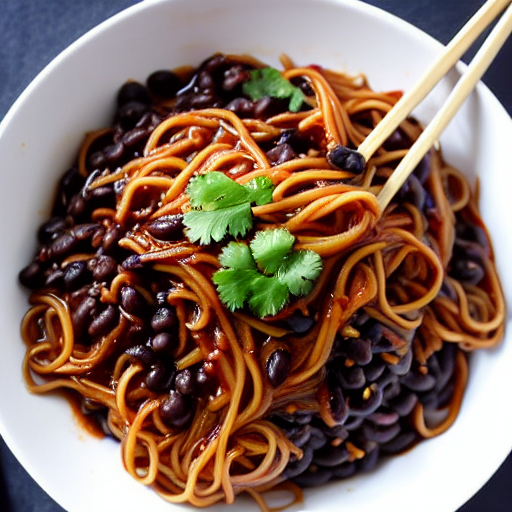Shirataki Noodle Jjajangmyeon
Shirataki Noodle Jjajangmyeon is a delicious and low-carb twist on the traditional Korean black bean noodle dish. Made with shirataki noodles and a rich, savory black bean sauce, this dish offers all the flavors you love without the carbs.

30 minutes
Difficulty: Medium
Korean
350 kcal
Ingredients
- Shirataki noodles - 200 grams
- Pork belly, diced - 150 grams
- Onion, diced - 1 medium (150 grams)
- Zucchini, diced - 1 small (100 grams)
- Carrot, diced - 1 small (50 grams)
- Garlic, minced - 3 cloves
- Ginger, minced - 1 teaspoon
- Black bean paste (chunjang) - 2 tablespoons
- Soy sauce - 1 tablespoon
- Sugar substitute (erythritol or similar) - 1 teaspoon
- Sesame oil - 1 teaspoon
- Vegetable oil - 1 tablespoon
- Green onion, chopped - 2 tablespoons
- Water - 200 milliliters
Steps
- Drain and rinse the shirataki noodles under cold water, then set aside.
- In a large skillet or wok, heat the vegetable oil over medium heat and add the diced pork belly. Cook until browned and crispy, about 5 minutes.
- Add the diced onion, zucchini, and carrot to the skillet. Sauté for about 3-4 minutes until the vegetables are soft.
- Stir in the minced garlic and ginger, cooking for another minute until fragrant.
- Add the black bean paste, soy sauce, and sugar substitute to the skillet, mixing well to coat the meat and vegetables.
- Pour in the water and bring the mixture to a simmer. Let it cook for about 5-7 minutes to thicken the sauce, stirring occasionally.
- In the last 2 minutes, add the rinsed shirataki noodles to the skillet, mixing them into the sauce to heat through.
- Drizzle with sesame oil and garnish with chopped green onions before serving.
Nutrition
- Calories: 350
- Protein: 25 g
- Carbs: 10 g
- Fiber: 5 g
- Sugar: 2 g
- Sodium: 800 mg
- Cholesterol: 50 mg
- Total Fat: 20 g
- Saturated Fat: 7 g
- Unsaturated Fat: 13 g
- Water: 0.2 L
Health Benefits
- Low in carbohydrates, making it suitable for low-carb diets.
- Rich in protein due to the pork, which supports muscle maintenance and repair.
- Contains fiber from vegetables, promoting digestive health.
Tags
KoreanLow CarbPasta Dish